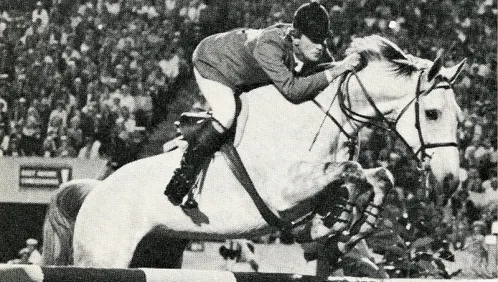On the final day of any horse show, the scene is sadly familiar: As the tack room drapes come down and the last horses are loaded onto vans, colorful tangles of unwanted show ribbons are tossed in the aisles or thrown in trash bins.
Maybe you’ve thought to yourself: “Too bad there’s not some kind of second life for these pretty tokens of achievement.” Sue Copeland had that same thought, but she went a step further and turned contemplation into action—launching a project called Ribbon Recycling, a one-woman endeavor to put discarded and used ribbons into the hands of elated equestrians at therapeutic riding centers.
Copeland, who lives in Richmond, Texas, recalled the event that inspired her to start her program: It was the 2009 FTI Winter Equestrian Festival (Wellington, Fla.), where she had traveled with her trainers Peter Pletcher and Danny Arendt. Copeland was particularly shocked to see so many discarded ribbons in the stabling areas.
“A lot of people would kill to get any color of ribbon at WEF,” said Copeland, who shows in the adult amateur hunter division. “So to see all those ribbons lying in the dirt was kind of a surprise.”
This prompted Copeland to start thinking seriously about possible uses for unwanted ribbons, and it didn’t take long for an idea to take shape. For years, Copeland had been donating used horse equipment, tack, books and magazines to Houston-area therapeutic riding centers. She knew that those centers would likely welcome donations of used show ribbons to hand out at competitions or award ceremonies. After calling around, she discovered she was right.
Copeland, a longtime contributing editor at Horse & Rider magazine, realized that the therapeutic riding centers in her area probably weren’t the only ones that would appreciate receiving donated ribbons. But online research didn’t reveal the existence of any ribbon-donation programs for therapeutic riding centers anywhere.
Spreading The Word
So in May 2009, Copeland used her monthly column to float the idea to the magazine’s 160,000 readers and got an enthusiastic response. Many people, she learned, would be willing to collect unwanted ribbons at local horse shows and either donate them to therapeutic riding centers in their respective communities or send them to Copeland for distribution.
Energized by the response, Copeland spent the next several months trying to figure out a way to coordinate a large-scale ribbon recycling effort that would encompass the magazine and various national sponsors, as well as herself. Meanwhile, “I put the people who were willing to collect and ship me ribbons on hold because I didn’t have a place to send them,” said Copeland.
But it turned out there were too many obstacles for a multi-faction effort—lack of manpower and space, ill timing and the struggling economy, among other things—so Copeland decided to strike out on her own. In May 2010, she wrote another Horse & Rider column outlining the idea and sent an email to numerous additional people and organizations that she knew might be interested in contributing ribbons to the project. Again, the feedback was significant and positive.
ADVERTISEMENT
“I’ve received inquiries from programs wanting to receive ribbons as well as people who want to donate,” Copeland reported, “including horse show managers, individuals and therapeutic programs from around the country. I’ve heard from lots of people who’ve boxed up their ribbons and donated them to therapeutic riding facilities in their own areas, all across the U.S. And the responders are from both the English and Western riding worlds.”
At her end, Copeland began setting out recycling bins (discovering that sturdy plastic tubs work best) at some of the Texas spring horse shows. “The reception was enthusiastic,” she said. “The general comment by people at the shows has been: ‘What a great idea.’ Or, ‘Oh my gosh, I need to go home and go through my ribbon collection to donate.’ However, I’ve learned that I need to alert show managers ahead of time, because some shows collect the ribbons that aren’t claimed and return them to their inventory, or exchange them for new ribbons with date revisions. I’m better prepared now.”
Demand Outweighs Supplies
To date, Copeland has collected hundreds of ribbons from horse shows and individuals. She also was thrilled when a ribbon company in Vermont sent her two big boxes of ribbons and has promised to ship some trophies as well.
“But I actually have more people waiting for ribbons than I have ribbons for, at this point,” said Copeland, adding that besides the handful of Texas-based therapeutic riding programs that she serves, about a dozen out-of-state programs are on her waiting list.
Not surprisingly, the North American Riding for the Handicapped Association, based in Denver, Colo., is supporting Ribbon Recycling. Association leaders posted information about the project in the bimonthly online newsletter to alert program directors who might be in need of ribbons, or individuals who might have ribbons to donate.
“I think what Sue is doing is great,” said Barbara Yost, individual and corporate partnership coordinator for NARHA. “The centers that responded really did want to get hold of some ribbons. A lot of programs host competitions and events where it’s wonderful to have ribbons to award, yet most aren’t highly funded—so that kind of donation is very appreciated.”
Pat Roddy, managing director of SIRE (the umbrella title for Houston’s Therapeutic Equestrian Centers), agreed. SIRE is one of the recipients of Copeland’s ribbons, which they “customize” by trimming the streamers of any existing wording (the name of a horse show, etc.) and placing a SIRE logo at the center of the rosettes.
“Sue is wonderful,” Roddy declared. “It’s very generous of her to take the time and effort to collect these ribbons and distribute them. The kids and adults just love the ribbons, and they don’t care what color they are.”
Both Roddy and Yost suggest that people contact their local therapeutic riding programs to see if ribbon donations are wanted, a notion that’s wholeheartedly endorsed by Copeland.
ADVERTISEMENT
“These ribbons are wasted in the dirt.” Copeland said, “I wish people would save them and send them to me or to a local therapeutic riding center instead of throwing them away. For most therapeutic programs, ordering brand-new, pristine ribbons is a bit of a financial stretch. It thrills me to no end to be able to take something that someone doesn’t want and give it to someone who really, really wants it.”
Sharing Copeland’s enthusiasm for the cause is Arendt, one of her trainers from PJP Farm in Magnolia, Texas. Arendt is Copeland’s No. 1 volunteer, collecting not only huge bagfuls of ribbons from horse shows all over the country, but used tack and equipment as well. Arendt said he’s inspired by Copeland’s dedication to the project.
“What Sue is doing is so amazing,” Arendt said. “She has such a passion for the horses, and she really wants to give her time and help out. She’s really trying to be involved in making those kids happy. I think more horse show managers should get involved in doing something like this, because at the end of any show, there are so many people who throw their ribbons away.
“When I see someone throwing their ribbons away at shows,” Arendt added, “I tell them to give them to me because I’ll make sure they get to someone who needs them.”
One of the many people on board with Ribbon Recycling is Roxanne Cook, finance and event coordinator for Houston’s annual Pin Oak Charity Horse Show.
“For the people in these therapeutic riding programs to get some sort of ribbon is fabulous,” Cook stated. “And it’s so heartfelt for Sue to take on this responsibility and make these people feel so good. I think it’s cool that the ribbons are getting a second chance at life. Instead of going into the trash, they’re going up on a wall or on someone’s dresser somewhere.”
A Hopeful Future
While Copeland continues to run Ribbon Recycling on a day-to-day basis, she’s also looking ahead.
“I would hope that someday we could facilitate a national distribution center,” Copeland mused, “even at a grassroots level, and even if it’s just me. I’m going to continue to get the word out and gently nudge some of the people who’ve pledged to send ribbons. If it grows to a bigger level, that’s great, but if it stays relatively small, I’ll just keep on doing it alone. I’m very willing to do it.”
Although she’s grateful for the support of so many who laud her efforts, Copeland pointed out: “The real heroes are the staffs, instructors, volunteers and horses at these facilities. I’m humbled by their passion, enthusiasm and dedication. Watching the riders smile through their performances, then light up when they get their ribbons, makes my year.”
Sue Copeland and her husband Rick share their 12-acre, Houston-area farm with four horses, three dogs and one cat. Learn more about her Ribbon Recycling project at ribbonrecycling.com.














